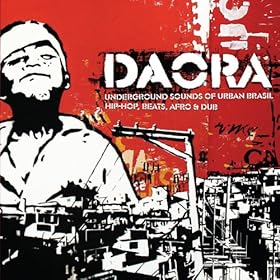Daora: Underground Sounds of Urban Brazil: Hip-Hop, Beats, Afro and Dub

Daora was released on June 3rd by Mais Um Discos, a deliberately eclectic label, which specializes in Brazilian music, but is based in London. This compilation is not concerned with presenting a thorough picture of any of the many Brazilian scenes that it covers. Rather, as its title (Daora means “something that’s dope” in Sao Paolo) indicates, Daora shares the Brazilian music scene’s dopest gems– and there happens to be quite a few of them. Rodrigo Brandao put together the compilation, and his list of past collaborators– Tony Allen, The Roots, Prince Paul, various artists off the Ninja Tune roster– gives a good idea of his taste: Afrobeat, hip-hop rooted in jazz and funk, and thinking man’s electronic music.
Brandao cites both Big Boi and Arthur Verocai as influences on today’s breed of Brazilian innovators. Why shouldn’t the two go together? Verocai, whose lone 1972 solo album was first released in obscurity and later became highly sought after for obsessive record collectors, has been sampled by DOOM, whose Stones Throw labelmate Madlib has also professed his appreciation for the record. Between American and Brazilian music, it’s often hard to say who influenced whom. Of course, the Tropicalia movement of the 60s and 70s took cues from American and British psychedelia, but it twisted the music in new and exciting ways, melding it with traditional Brazilian music and inventing new innovations. Since then, Western artists like Stereolab and Beck have paid homage to Os Mutantes and others from that scene.
This is a 32-track compilation that somehow has very little in the way of weak moments. Among the highlights are “Vestido De Prata,” a laid back reggae-psych track by Curumin (real name Luciano Albuquerque), a musician from Sao Paolo, who plays the cavaquinho, an ancient Portuguese variant on the guitar. “Balboa Da Silva” is fast-paced, funky Afrobeat performed by Bixiga 70, who take their name from the Sao Paolo neighborhood of Bixiga, which is home to immigrant populations from Italy and Africa, as well as displaced Brazilians from the Northeast. Anelis Assumpção‘s “Not Falling” first seems like a rare misfire, starting off as slow-burning dub before building up to a raucous dancehall finish in its last minute. It’s really hard to find fault with much here. The music is at once familiar and exciting– it builds off established genres, but does not repeat clichés. It fits into the long and outstanding tradition of Brazilian music.
-Jesse Brent